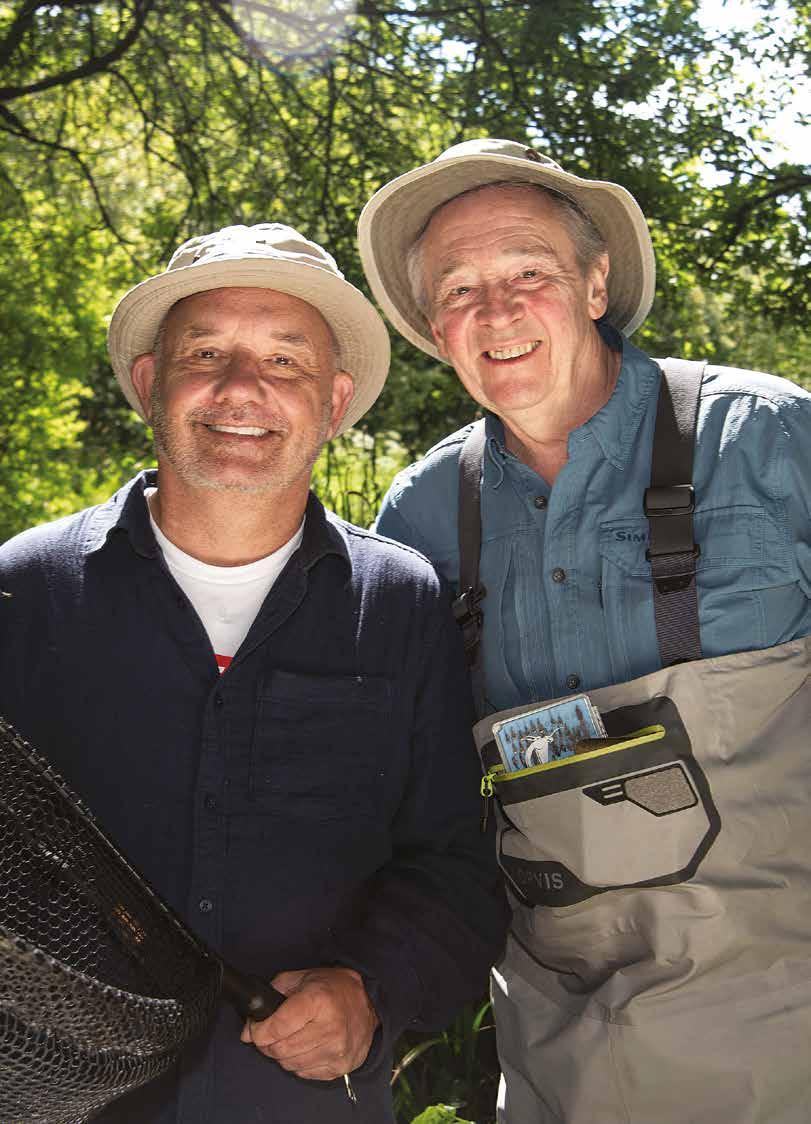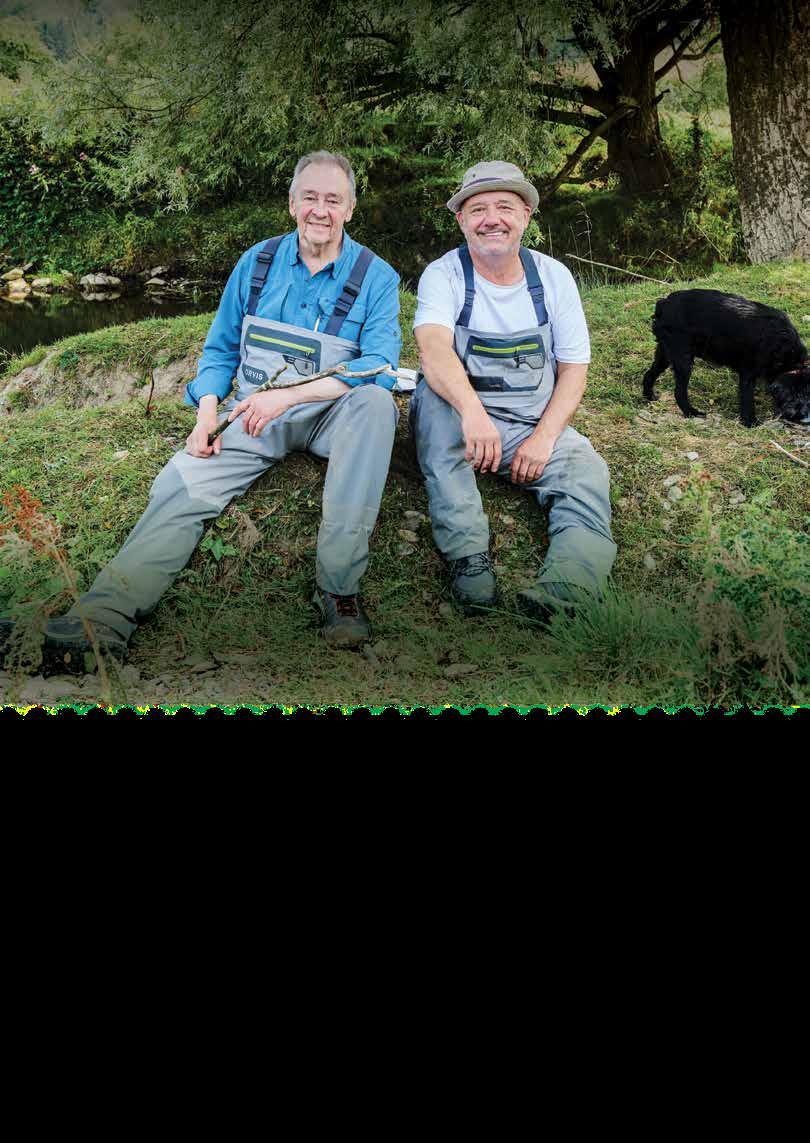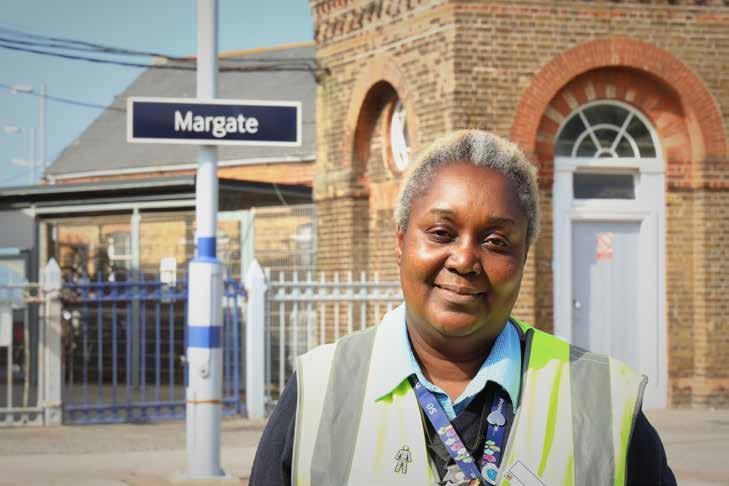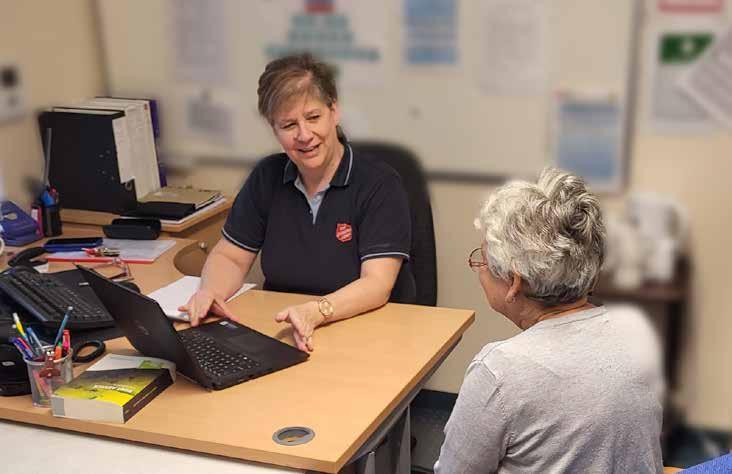

Back in the reel world
Bob and Paul return to the riverbank

Museum is on brand with the past
What is The Salvation Army?
The Salvation Army is a Christian church and registered charity seeking to share the good news of Jesus and nurture committed followers of him. We also serve people without discrimination, care for creation and seek justice and reconciliation. We offer practical support and services in more than 700 centres throughout the UK. Go to salvationarmy.org.uk/find-a-church to find your nearest centre.
What is the War Cry?
The Salvation Army first published a newspaper called the War Cry in London in December 1879, and we have continued to appear every week since then. Our name refers to our battle for people’s hearts and souls as we promote the positive impact of the Christian faith and The Salvation Army’s fight for greater social justice.
From the editor’s desk
It only takes the quickest of trips to a supermarket, garden centre or department store to know that Christmas – with all its trimmings and celebrations – will soon be with us.
There are countless lights, decorations, chocolates and treats available to buy, and that is even before customers’ attention is drawn to the toys and gifts that are stacked on the shelves. The thought of receiving and buying presents can be an exciting prospect – providing we have the funds to make our purchases.
For many people, the weeks leading up to Christmas are a stressful time as their regular struggle to make ends meet becomes all the more difficult. The added expectations of the season can lead to big debts on credit cards or a bigger overdraft at the bank.

However, debt can be a problem at any time of the year, and The Salvation Army has responded to this reality by establishing debt advice centres across the country. In an interview in this week’s War Cry, the church and charity’s financial inclusion development manager, Lorraine Cook, tells us about the services.
‘We offer financial capability to help people budget and understand how they can maximise their income and minimise their expenditure,’ she says.
Editor: Andrew Stone, Major
Managing Editor: Philip Halcrow
Staff Writer: Emily Bright
Staff Writer: Claire Brine
Staff Writer: Ewan Hall
Editorial Assistant: Linda McTurk
Graphic Designer: Mark Knight
Graphic Designer: Natalie Adkins
Email: warcry@salvationarmy.org.uk
The Salvation Army
United Kingdom and Ireland Territory
1 Champion Park London SE5 8FJ
Tel: 0845 634 0101
Subscriptions: 01933 445445 (option 1, option 1) or email: subscriptions@satcol.org
Founders: Catherine and William Booth International leaders: General Lyndon Buckingham and Commissioner Bronwyn Buckingham
Territorial leaders: Commissioners Jenine and Paul Main
Editor-in-Chief: Major Julian Watchorn
Published weekly by The Salvation Army © The Salvation Army United Kingdom and Ireland Territory ISSN 0043-0226
The Salvation Army Trust is a registered charity. The charity number in England, Wales and Northern Ireland is 214779, in Scotland SC009359 and in the Republic of Ireland CHY6399.
Printed by CKN Print, Northampton, on sustainably sourced paper


On the War Cry, we’re aware that the time leading up to Christmas can be challenging financially, and so during November our recipes will feature a series of Money-Wise Meals, which are great for anyone cooking on a budget.
The recipes come from The Salvation Army’s Victory Programme, on which people can learn to cook, garden and create low-cost meals.
There is a reason why a church is interested in helping people in practical ways, particularly if they are finding life tough, as Lorraine explains in her interview.
‘We see the person as a child of God. That’s fundamental in what we do,’ she tells us.
Christians believe that God loves everyone as his child, which means that we all have value – a truth that is worth celebrating all year round.
When you’ve read the War Cry, why not pass it on ➔ ➔ ➔





Comedy pair return for more fishing adventures
By Emily Bright
TV viewers – whether anglers or not –are surely hooked again already. Bob and Paul are back for another series of Mortimer and Whitehouse: Gone Fishing, in which the comedy duo and old friends catch and return fish, cook heart-healthy meals and converse about … well, anything and everything.
In the first episode of the new series last weekend, they travelled to the water meadows of the River Itchen in Hampshire, where Paul had always wanted to fish with Bob.
As they cast off into the chalk stream for wild brown trout and grayling, Paul gave Bob a quick refresher course on flyfishing.
While fishing in crystal-clear waters, they basked in the beautiful scenery around them. Mayflies flitted by, a bird of prey soared above and light played on the tree trunks. Their canine companion Ted trotted about, exploring the riverbank. And the pair chatted about all sorts – be it exercise, health or ageing. Other times they became nostalgic about their
past – perhaps something that came into greater focus as Paul celebrated his birthday.
Ahead of the first episode being broadcast, Paul said: ‘The thrust of this series is that we go to places that we’ve either fished before or resonate with us from our past or mean a lot, and so I think there’s maybe an extra level of poignancy to this series. It’s a little bit more heartfelt.’
He added that fishing provides ‘that instant link to your past, to friends, to your childhood, and we’re lucky enough to still have something that makes Bob and me feel like that. That’s a rare gift as well, that sort of straight line to your childhood, and the magic of it.’
There’s something powerful about nostalgia and remembering happier times – it can provide a source of steadiness and comfort in an everchanging world.
But comfort can also come from the knowledge that, while our lives may change, there are some constant things

which we can rely on.
For many people, nothing is more reliable than God’s love.
The Bible records how a man called Jeremiah found himself reflecting on the course his life had taken. While he was honest about the painful times he’d suffered, he said that he could rely on the faithfulness of God to see him through.
‘The steadfast love of the Lord,’ he said, ‘never ceases; his mercies never come to an end; they are new every morning’ (Lamentations 3:22 and 23 English Standard Version).
The steadfast love of God is something that countless Christians can testify to, whether they are looking back over their past or thinking about their present. And it’s something that everyone can experience.
We don’t have to cast our net far – all we need is to pray to God, and he will reveal himself to us.
If we invite him into our lives, we’ll discover that a relationship with God is the reel deal.
fishing in Hampshire
TV feature: Mortimer and Whitehouse: Gone Fishing Sundays BBC2 and iPlayer
Fatherly advice
Claire Brine gives her take on a story that has caught the attention of War Cry reporters
Stephen Graham and Orly Klein are appealing to dads everywhere to help them write a book entitled Letters to our Sons. The Emmy-winning actor – who played the father of a criminal teenage boy in Netflix drama Adolescence – and the psychology lecturer are turning in particular to fathers of sons, asking for their advice and experience.
The book will be ‘a collection of letters filled with your thoughts and wisdom that you want to pass down to your lad’, they explain. ‘It’s going to be a game-changer in how we raise our boys to be the men we would like them to be.’
The pair ask dads to write about ‘what you wish you had known when you were younger’ and to share their thoughts on what ‘being a man should be about’. They add that they are creating the book because ‘we need more of an open conversation between fathers and their sons’.
There
are good men to look up to
After Adolescence made headlines earlier this year for the way it explored – in The Guardian’s words – ‘male rage, toxic masculinity and online misogyny’, I think it’s important for boys and young men to know that their future doesn’t have to fall into such patterns of damaging behaviour. An alternative narrative is possible. There are good men out there to look up to. The future generation of men can be good too.
As I thought about what dads might write in letters to their sons, I found myself pondering my heavenly Father as portrayed in the Bible – the book that Christians believe is God’s love letter to both men and women.
It’s a book that tells us how much God loves us. It explains that when we face bad times, God will never leave our side. It highlights that God is a Father who will listen to us, meaning that we can tell him things we can’t tell anyone else. It teaches us that when we make terrible mistakes, God is willing to forgive us and show us how to do and be better.
The Bible brings us closer to the best Father we could ever know – and it’s a book that generations of readers have called a gamechanger.
talk talk Team talk Team talk ‘ ’ j TEA M TALK


The Salvation Army played a key role in the process which enabled John Lewis to launch an innovative knitwear collection made from 100 per cent reclaimed and repurposed wool. The department store chain created its Circular Knitwear Collection of jumpers, scarves and beanie hats partly from unwanted garments donated to its FashionCycle scheme and collected by the Salvation Army Trading Company (SATCoL). Using innovative machinery, SATCoL – which carries out recycling work to benefit the environment and raise money for The Salvation Army’s community projects – separated out the garments made from wool fibres, and transported them to Iinouiio, a textile recycler. There, the materials were cleaned, colour-matched and combined with other waste wool and prepared for respinning. Yarn spinners Z Hincliffe & Sons and knitting company Skinwear completed the recycle process by creating new yarn which could be turned into new woollen garments.

Prayer is central to full-back Dorgu
Manchester United’s Patrick Dorgu has spoken about how his Christian faith guides him on and off the pitch.
In an interview with the club’s website, the Danish full-back, who joined United in January, explained that his Igbo middle name, Chinazaekpere, means
‘God answers prayers’.
Dorgu spoke of how religion was central to his upbringing and continues to guide him.
‘It means a lot to me; it’s always been a big part of my life and my family’s,’ he said. ‘I’ve always been praying ever since I was young and I still keep praying.
‘I always think that God has a plan for everything, and the fact United were the only team coming in for me in January meant for me, it has to be here.’
Graffiti art asks questions in the cathedral
Art using graffiti-style lettering has been fixed to the walls, pillars and floors of Canterbury Cathedral in a new exhibition. The graphics – created by poet Alex Vellis, curator Jacquiline Creswell and a team of artists – are the result of workshops in which groups of people responded to the question: ‘What would you ask God?’
The resulting questions portrayed in the Hear Us exhibition include ‘What happens when we die?’ and ‘Are you there?’
Modern slavery support for Britons
More than 2,000 survivors of modern slavery accessed The Salvation Army’s support services over the past year – and, of the 111 nationalities they represented, the second-largest was British.

The church and charity says that 246 British adults entered its modern slavery support services. The only larger national group among the 2,409 potential victims who began receiving support were
The most common form of exploitation experienced by the people entering the Salvation Army support services was forced labour. Other survivors had faced sexual exploitation and domestic
Since 2011, when it took on the government contract for care of modern slavery victims in England and Wales, The Salvation Army and its partners have helped nearly 27,000 survivors, offering safe housing, counselling and recovery programmes.
‘Modern slavery remains a widespread problem in every town, village and city,’ says Major Kathy Betteridge, The Salvation Army’s director of anti-trafficking and modern slavery. ‘We are determined to reach those still trapped.’
Keeping track of time
A station worker and her daughter have been travelling the length and breadth of Britain to celebrate Railway 200 – inspired by a calendar
Feature by Philip Halcrow

and
visit the scene of the photograph for October on the Railway Mission calendar



Dani
Kuda
The train travellers now arriving at London Blackfriars are happy that the evening is growing dark. Kudakwashe Osoba and her daughter Dani want the view from the Millennium Bridge, just along the Thames, to be something like it is in the photograph that they have been looking at for the past few days.
Throughout the year, Kuda and Dani have been travelling up and down the country, celebrating the 200th anniversary of the modern railway by visiting the locations featured in the 2025 calendar produced by Railway Mission, a Christian charity whose chaplains support people working on the railway as well as travelling members of the public.
When Kuda and Dani meet me at Blackfriars on this Saturday evening in October, they plan to take in the scene on the month’s photograph: a night-time shot of a train crossing the river, with Tower Bridge in the distance.
A few minutes later, they stand on the Millennium Bridge to have their photo taken and watch a train or two cross over the Cannon Street rail bridge.
Afterwards, in a riverside pizzeria, Kuda, a member of the platform staff at Margate station in Kent, and Dani, a musician, reflect on their Great British railway journey so far.
Kuda explains that their ‘escapade’ started when Lee Woolcott-Ellis, the mental health lead at train company Southeastern, was handing out the calendars produced by Railway Mission.
‘Lee asked if I wanted one of the calendars,’ she remembers. ‘He said it had lovely pictures in it, so I started flicking through. And straightaway I said: “It would be great to visit each of these places.”
‘At the same time, people at Southeastern were talking about Railway 200 and how they were going to engage in the celebrations. I brought the calendar home and said to Dani that I was going to visit each place.’
Dani decided to join Kuda on her travels.
So in January, the pair made their way to the Spa Valley Railway heritage line at Tunbridge Wells, and the following month to London’s Docklands. Both were easy trips from their home in Sittingbourne.
‘But,’ says Kuda, ‘when I was looking

through the calendar at the other places – we could hardly pronounce them, let alone have any inkling of where they were. And when I looked Arbroath up, I said: “That’s going to be a two-day job.”’
Initially, says Kuda, they had planned simply to visit the locations, and they would take some pictures that would later serve as reminders of happy days out.
We have seen different parts of the country
‘Butthen, when we began making the trips, I thought it would also be good to have a different way of expressing our experiences. Because I write poetry, I thought it would be an interesting challenge to put something down in words.
‘It became quite an easy challenge, because I decided to write down what we said – and we’re quite talkative people –and what we heard other people saying.’
‘And,’ adds Dani, ‘people say the funniest things.’
So, for instance, their visit to the Spa Valley heritage line captures a little boy’s protestation, ‘I don’t want to get on that silly train’ (followed by their own
observation ‘the little boy got on the train!’); and a trip north of the border is commemorated with lines such as: ‘So, the name of the place is…/ Burn-tisland?/ No, it’s Burnt-island!/ Wow! I’ve been telling everyone the wrong name all along.’
Kuda would have been thankful for the Railway Mission calendar if all it had done was prompt her to go on her adventure with Dani.
‘Without the Railway Mission calendar, I wouldn’t have had the idea which has given us the opportunity to see different parts of the country and to enjoy the relationship that we have,’ she says.
But she also has appreciated the Bible verses that appear on each month’s page.
Kuda, with Dani, attends Sittingbourne Baptist Church – and also aims to live out her faith in her work at Margate station. ‘I feel like I’m an ambassador for God,’ she says.
Kuda explains that she tries to demonstrate her faith in her interactions with other staff.
‘God does open your eyes to certain needs, even at work, when someone
Turn to page 8 f
Kuda and Dani on last month’s trip to London

From page 7
maybe needs you to spend a bit more time with them than just saying, “Good morning. Are you OK?” and then moving on when they just reply in the British way, “Yes.”’
Her faith also influences the way she approaches passengers in what can be a stressful environment.
‘Somebody may come into the station very worried about missing their train because of an important meeting or appointment that they have, and it presents in what looks like aggression,’ she says. ‘But if you can try to get below some level to find out exactly what the problem is, then it makes things easier.
‘It’s not always possible. But sometimes, if you take the time, you can help them.’
Whether with staff or members of the public, Kuda tries to be sensitive to what they may need.
‘I do sometimes get a feeling that I need to be somewhere,’ she says. ‘The Lord guides you, if you open yourself to being guided. And every day I try to ask: What is the mission for today? Who is the person I need to smile at or make eye contact with?
‘It can be difficult. In a busy train
station, everyone has got their headphones on, they’re on their way to wherever they’re going and they don’t necessarily want to interact with you if they don’t need to. But I have found that just making eye contact and saying good morning every day wins people over, and then you can slowly start to engage with them more.
Nobody cries on the shoulder of a stranger
‘There’s something in my African background which says that nobody ever cries on the shoulders of a stranger. If you have a problem, it’s very rare that you will go to somebody completely unknown to you and trust them with any deep issue. You will normally go to someone you trust.
‘So it’s important to make an initial connection with people so that you can support them when the time comes.’
As they approach the last legs of their calendar-inspired adventure, Kuda and Dani talk of how much they have enjoyed the experience.
Dani has appreciated the time they have spent together – as well as the encounters they have had with other people.
‘A train is a community space,’ she says. ‘You never know who you are going to bump into or get talking to.’
Kuda reflects: ‘Do you ever have times when you think, “I couldn’t have planned this any better”? And then you realise that you didn’t plan it. God’s hand was in it all.
‘We’ve stayed in some amazing places and we’ve stayed in some dodgy places that made us laugh. We’ve met some characters.
‘And the views have been amazing. I was complaining when we were going to the bridge in Llangollen and had to walk about 45 minutes. Walking is not my favourite pastime. But I decided just to engage with it. And the views and the forest were beautiful. It has been so good to be exposed to God’s creation.
‘Our journeys have brought surprising moments with surprising views – even this,’ she says, looking across the Thames towards the illuminated dome of St Paul’s Cathedral.
‘It has been a blessing.’
Kuda is a member of the platform staff at Margate
‘We come alongside people who are struggling’

With Christmas fast approaching and bringing financial pressures for some people, The Salvation Army’s financial inclusion development manager, LORRAINE COOK, explains why understanding debt is more crucial than ever – and how the church and charity is helping people to break free from it
Interview by Ewan Hall
The cost of living continues to be at the forefront of many people’s minds. Nearly half of UK adults – 48 per cent – say that an unexpected £100 expense could jeopardise their ability to pay their rent or mortgage. This alarming statistic was revealed in a poll commissioned by The Salvation Army at a time when the gap between income and essential living costs continues to make news headlines.
But in the eyes of Lorraine Cook, The Salvation Army’s financial inclusion development manager, the issue of money worries goes deeper than our pockets –

it’s rooted in our mindset.
‘I believe in this country we don’t discuss debt enough,’ she says. ‘We don’t have those serious conversations with our family and friends.’
With Christmas on the horizon, Lorraine acknowledges the emotional and financial pressures that many people are facing.
‘It can be a really difficult time,’ she says. ‘There’s often a strong desire to give – especially to our children – and we’ve all felt that pressure to make the season special.
‘For some, spending money brings a sense of happiness, even if it’s just for the
Lorraine Cook
moment. It’s tied to personality too – some people find joy in giving and spending, and that’s OK. But it’s important to have open conversations about the emotional and financial impact of spending and not be afraid to talk about it honestly.’
In the UK, being ‘work poor’ – that is, employed but still struggling to make ends meet – is a reality for many. Lorraine explains that financial difficulty is often seen as a personal failure, which prevents people from seeking help.
To tackle people’s money problems, The Salvation Army aims to provide a robust and compassionate debt advice service that helps individuals escape financial hardship and that also brings them into a group which cares and supports them.
The service is authorised and regulated by the Financial Conduct Authority, ensuring high standards of professional support. Trained advisers work face to face with clients to assess their financial situations, address priority debts and explore tailored solutions.
‘We work with people who have different vulnerabilities and different learning abilities,’ says Lorraine. ‘So it might be OK
to end a meeting with one client by saying, “There’s one thing I need you to do before the next meeting”, whereas another client might be capable of having five things to do before the next time we meet them.
It’s not us they’re angry with – it’s life
‘It’s
easy to learn the financial process.
But what truly matters is how we respond to someone’s circumstances and emotions. People may come to us feeling very angry or deeply upset. It’s not us they’re angry with – it’s life. It’s the hand they feel they’ve been dealt.
‘We have people referred to us by their social worker who are trying to sort out a number of challenges in their lives – not just their finances.’
Even people who appear financially stable – paying off credit cards monthly or managing a household budget – can still be vulnerable. If redundancy strikes, the advice to ‘save three months of bills’ can feel unrealistic.
An additional problem, as Lorraine explains, is that people often don’t recognise themselves as being in major debt until it is too late.
‘They think, “I should be able to sort this out. I run my own business, I manage the household budget.” They feel that they should be able to cope.
‘We offer financial capability to help people budget and understand how they can maximise their income and minimise their expenditure. And sometimes hard conversations have to happen. There’s responsibility on the client too. We don’t do it all for them; we’re doing it with them.’
The debt advice service works with external agencies, including local councils, energy companies and social services to ensure that clients receive comprehensive support.
But the support given by The Salvation Army goes far beyond numbers.
‘It’s not just about getting people out of debt,’ Lorraine asserts. ‘It’s about how we prevent people from getting into debt again.’
The Salvation Army also supports clients by providing practical help such


as food parcels and gas and electricity top-ups. Such assistance opens the door for deeper conversations about underlying issues. The church and charity takes a holistic approach, recognising that debt rarely exists in isolation. Many clients face multiple challenges including mental health issues, long-term illness, unemployment or family breakdown.
They feel that they’re not going to be judged
Whensomeone comes to a Salvation Army debt service for help, financial advisers assess income, expenditure and debt levels, identifying urgent issues that need to be dealt with promptly. Many of the clients are unaware of the financial support they could be eligible for, so the service checks – with the client’s permission – whether they are claiming all the benefits they’re entitled to, including universal credit, housing support and disability allowances.
‘Lots of people don’t know that they’re not claiming what they could be claiming,’ notes Lorraine, pointing out that the lack of awareness can be a major barrier to financial stability.
Last year, The Salvation Army helped clear more than £4 million of debt. But helping to clear debt is just part of the assistance it offers to people struggling financially. Through in-person or telephone appointments, it also helps to equip individuals with the knowledge and skills to manage their money independently. In one-to-one sessions, workshops and initiatives such as the Victory Programme – in which people can learn to cook, garden and create low-cost meals – the Army creates a space where people can get together and share experiences.
The Salvation Army also runs Employment Plus, a programme for people who are struggling to find work. It offers support with job searches and helps people to build confidence and skills.
Lorraine believes that The Salvation Army’s financial inclusion work is set apart from other similar services by its person-
centred, non-judgemental approach rooted in its Christian ethos.
‘People sometimes come in with mental health issues, and they see The Salvation Army’s branding and name and feel it is a safe place for them,’ she says. ‘They feel that they’re not going to be judged.
‘We see the person as a child of God. That’s fundamental in what we do.’
The result of this approach is that longterm, trusting relationships can be built. Some clients go on to become volunteers or, on occasions, employees of The Salvation Army. Some become members of the worshipping church communities.
For Lorraine, leading The Salvation Army’s debt advice service is not just a job – it’s a calling. Her faith guides her in managing a regulated service, supports her in moments of doubt and confirms for her the reason why this work is important.
‘It’s rewarding. It’s God-honouring,’ she says. ‘We come alongside people who are struggling, and we walk with them –sometimes carrying them, if we need to.’
Prayerlink
The War Cry invites readers to send in requests for prayer, including the first names of individuals and details of their circumstances, for publication. Send your Prayerlink requests to warcry@salvationarmy.org.uk or to War Cry, 1 Champion Park, London SE5 8FJ. Mark your correspondence ‘Confidential’.
jBecoming a Christian
There is no set formula to becoming a Christian, but many people have found saying this prayer to be a helpful first step to a relationship with God
Browsing the Bible
Nigel Bovey gives chapter and verse on each book of the Scriptures
Between the Testaments
The latest external date reference in the Old Testament – ‘the 20th year of King Artaxerxes’ (Nehemiah 2:1 New International Version) – is circa 445BC. In the New Testament, the earliest contemporary time stamp is ‘in the time of Herod King of Judaea’ (Luke 1:5).
Herod ruled when Jesus was born, and his reign is traditionally calculated as beginning in 37BC. The 400 or so years between the two Testaments are sometimes known as ‘the silent centuries’. God, though, was far from inactive.
By the end of the Old Testament, the people of Judah have been released from Babylonian captivity by the newly dominant world power, Persia.
In 332BC, Alexander the Great defeated Persia, and Judah came under Macedonian rule. After Alexander died in 323BC, his kingdom was split, and Judah passed to the control of the Seleucid kingdom of Syria.
Lord Jesus Christ,
I know that I have done things in my life that are wrong and I’m sorry.
Thank you that I can ask you for forgiveness because of the sacrifice you made when you died on the cross.

Please forgive me and help me to live a better life in the future as I learn how to love you and follow your way of living.
Thank you, Lord Jesus.

When Syrian King Antiochus IV (Antiochus Epiphanes) instigated a pogrom against all things Jewish, including murder and the desecration of the Temple, a resistance campaign followed.
The Maccabean Revolt (167–160BC) was led by the priest Mattathias and, later, his son Judas Maccabeus, who removed the occupiers from Judah. An account of the times is found in the books known as 1 and 2 Maccabees. Early on, the writer records: ‘We have been rescued by God from great danger, we give him great thanks for championing our cause against the king’ (2 Maccabees 1:11 New Jerusalem Bible).
These books, found in the Greek (Septuagint) and Roman Catholic versions of the Old Testament, provide eyewitness accounts of the persecution of the Jews and their consequent struggle for independence.
For most of the next 100 years, the Hasmonean dynasty – the last independent Jewish kingdom – reigns.
In 64BC, Rome takes over from the fading Hasmoneans. In 37BC, Rome appoints the Edomite Herod as a vassal king to rule from Jerusalem.
It is to King Herod that the Magi travel, asking for the location of the birthplace of a new ‘king of the Jews’ (Matthew 2:1 and 2). And a whole new Testament begins.

If you’ve prayed this prayer, scan the QR code or contact us using the coupon on this page

































































To receive basic reading about Christianity and information about The Salvation Army, complete this coupon and send it to


















QUICK QUIZ
Who plays adoptive father Jason Ross in the TV comedy drama Trying?
Which former Motown singer recently published his autobiography Truly?
Until this year, what was the name of the rugby union side now known as Newcastle Red Bulls?
Who played the title role in this year’s Superman film?
What is the capital of Switzerland?
Gary Barlow is the lead vocalist of which British pop group? 1 2 3 4 5 6
A little piece of history
Museum brings back memories
Feature by Claire Brine
Two hundred years of consumer culture are on display at the Museum of Brands in London’s Notting Hill, meaning that nostalgia-lovers today can bask in the memories of packaging and advertising of a bygone era.
Through the museum’s collection – which features decades-old crisp wrappers and treasured toys from centuries past – visitors are invited to reflect on history through the everyday items that generations before them would have thrown away. A time tunnel also places brands into their historical context, allowing people to consider how the world was transformed by events such as the invention of the motor car and television.
On the website of the museum, its founder Robert Opie says that he was keen to explore the evolution of consumer products and save packaging that otherwise would ‘surely disappear for ever’. Curator Alice Kain recently expanded on Robert’s view in an interview with Radio Times – whose covers are among the artefacts on display – explaining that the museum contains types of memories that people don’t find anywhere else – which is what makes it special.
‘Most museums tell us big history; this museum is all about little history,’ she said.
Whether it’s big or little, colourful or dull, we all have a past. Some parts of it, perhaps, we want to forget. But there are likely to be key moments in our life that we plan to cherish for ever.
As they journey through the years, many Christians find it useful to reflect on particular periods in their life when they felt that God helped or inspired them. Then, when tough times come along, remembering his love and guidance brings them comfort – and hope to face the future.
One Bible writer who recalled the powerful impact of God’s love on his life said: ‘Do not forget how kind he is. He forgives all my sins ... and blesses me with love and mercy’ (Psalm 103:2–4 Good News Bible).
When we turn to God and allow his peaceful presence to infiltrate our heart, we will never forget it – in good times and bad.


The Museum of Brands celebrates items and advertising from the past

ACROSS
1. Earnest request (4)
3. Acquire (3)
5. Dross (4)
7. Gaiety (9)
9. Teller of untruths (4)
10. Smirk (4)
11. Fire (5)
14. Establish (3, 2)
15. Restore (5)
17. Last letter of Greek alphabet (5)
18. Explode (5)
19. Tooth (5)
20. Inundate (5)
23. Tipster (4)
25. Inflamed eyelid (4)
27. Oil (9)
28. Exist (4)
29. Haul (3)
30. Gone before (4) DOWN
1. Bucket (4)
2. State (4)
3. Waist measurement (5)
4. Rate of movement (5)
5. Ballad (4)

6. Intend (4)

7. Domineering (9)
8. Interpret (9)
11. Picks out (5)
12. Musical drama (5) 13. Walk noisily (5) 14. Cry (3) 16. Armed conflict (3)
21. Least good (5)
22. Parrot (5)
23. Labour (4)
24. Melody (4)
25. Pace (4) 26. Compass point (4)
HONEYCOMB


Fold of skin covering the eye
Shoot.
Omega. 18. Burst.
Molar. 20. Swamp. 23. Tout.
Stye. 27. Lubricate. 28. Live. 29. Tow. 30. Past.
Girth.
Tempo. 5. Song.
Masterful.
Spots.
Tramp.
War.
Tune.
Step.
East.
Toupee. 2. Hamper. 3. Shears.
Flight. 5. Bikini. 6. Eyelid.
Small wig
Picnic basket

Sausage rolls
INGREDIENTS



375g ready-rolled puff pastry
400g sausage meat
1tsp onion granules
2tsp sage
1 egg, beaten, to glaze
METHOD
Preheat the oven to 200C/Gas Mark 6.


Unroll the pastry and cut in half lengthways, then into thirds, creating 6 squares.
Season the sausage meat in a bowl with the onion granules and sage, then mix well. Divide into 6 equal portions and roll into sausages.
Place a sausage at the top of each pastry square.
Brush a line of beaten egg at the bottom of each square.
Tightly roll each pastry square around the sausage and press down on to the beaten egg

Cut each sausage roll into 2 or 3 pieces.
Brush with the remaining beaten egg and snip the tops with scissors. Bake in the oven for 20-25 minutes and serve hot.
Quick lentil soup
INGREDIENTS
1 large leek, chopped
4 carrots, chopped
1l vegetable stock
50g red lentils
METHOD
Heat a little oil in a pan and add the leek.
Once the leek has browned, add the carrots, vegetable stock and lentils, then bring to the boil. Simmer for 20 minutes.
Once the carrots are soft, take the pan off the heat and blend with a hand blender until smooth and thick.
Spoon into 4 separate bowls, to serve.

